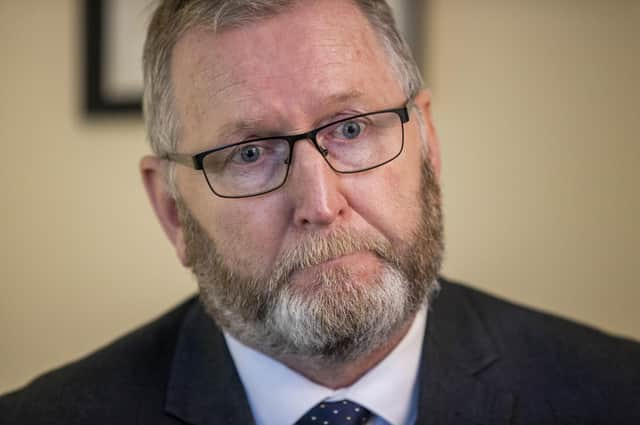Owen Polley: Doug Beattie’s tweets furore makes it harder for UUP to have a good Assembly election


The chances of the UUP meeting that description under its current leader, Doug Beattie, were undermined last week, thanks to his ill-advised use of social media.
I believe that unionism needs a liberal wing to appeal to people who are put off by conservatism. The UUP, which long ago lost a substantial part of its natural support to the DUP, could potentially fulfil this role. The caveat is that it has to remain serious, and firm in its support for the Union.
Advertisement
Hide AdAdvertisement
Hide AdPolicies are important, but, before we consider a political prospectus, most of us want a political leader that we can respect. That’s where 24-hour access to a smartphone may have caused Beattie irreparable damage.
When Beattie shared an inappropriate joke about Edwin Poots’ wife on Twitter last Saturday evening, the UUP had a problem, but it was solvable. When the media focused on his tweets before he became involved in politics, the party’s difficulties deepened.
Beattie has taken care to cultivate a ‘progressive’ image. He talks at length about women’s issues, emphasises his enthusiasm for LGBT matters and even endorses controversial causes, like the campaign to make gender a matter of personal choice rather than a function of biological sex. In taking these positions, he is trying to appeal to people who are unforgiving when it comes to poorly chosen language or infringements against political correctness.
You could argue that he was a victim of censoriousness, but there were already warning signs about his excessive use of social media before the latest revelations. He recently described a rival unionist as an ‘oxygen thief’, during a spat about southerners using Northern Ireland’s health service. When he was challenged about lockdown policy, rather than address the point, he posted a picture of a mountainous stomach and made a joke about ‘flattening the curve’.
Advertisement
Hide AdAdvertisement
Hide AdTo be fair, Mr Beattie is just one prolific ‘tweeter’ among many in modern political life. Like other politicians, he seems compelled to make some response when he is challenged on social media, whether it’s thought through properly or not.
Arguably, our political life has become far too focused on social media. Twitter in particular is an intense forum for debate, but it tends to amplify views that are not necessarily shared by people who spend less time online.
We might ask, fairly, why political leaders have time, when they are supposed to be managing their parties or taking care of ministerial duties, to respond to all-comers on the internet.
David Cameron is now viewed as a failed politician but he did lead his country, and he had the measure of Twitter when he observed that “Too many tweets might make a tw*t”.
Advertisement
Hide AdAdvertisement
Hide AdThere are other concerns about Doug Beattie’s guidance of the UUP besides social media. The Ulster Unionists’ attitude to the Northern Ireland Protocol has been ambivalent during his leadership. The party opposes the Irish Sea border, but it remains unclear whether it takes it seriously as an existential threat to the Union, rather than seeing it as an opportunity to outflank the DUP.
The protocol will continue to distance Northern Ireland from the rest of the United Kingdom and move it politically toward the Republic of Ireland, for as long as it is allowed to operate in its current form. You would think that every unionist should be putting an overwhelming amount of their energy into opposing this arrangement.
Yet Mr Beattie added the former Republic of Ireland senator, Ian Marshall, to his team and made him an Assembly candidate in West Tyrone, against the wishes of the constituency party there. Mr Marshall claimed the Irish Sea border created “opportunities for business and trade” and, rather than campaigning for its replacement, he said it’s “here to stay”.
As I stressed previously, there is a compelling argument that unionism is strengthened by representing a variety of socio-economic views. Mr Beattie talks about being liberal and uses a great number of buzzwords.
Advertisement
Hide AdAdvertisement
Hide AdIt’s sometimes unclear what these mean and they have not yet translated into solid, easily explicable policies. A lack of precision is not necessarily fatal for the UUP’s electoral prospects though. Most people decide first whether they can relate to a candidate or party, then consider its policies afterwards.
Before this furore, Ulster Unionists were encouraged by polls suggesting that Mr Beattie was popular with the public. They had high hopes that he would take votes off the Alliance Party and attract back liberal unionists who had stopped voting.
Perhaps he can still achieve a creditable result for his party in May, but the task will now be more difficult. A good start might be to tweet less and forget about selling his ‘woke’ credentials. Neither of these avenues are likely to be fruitful for the UUP leader any more.